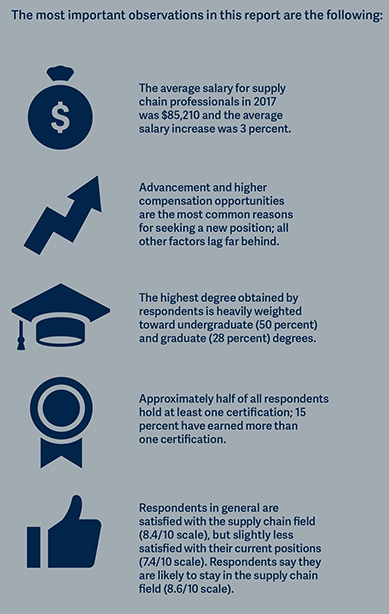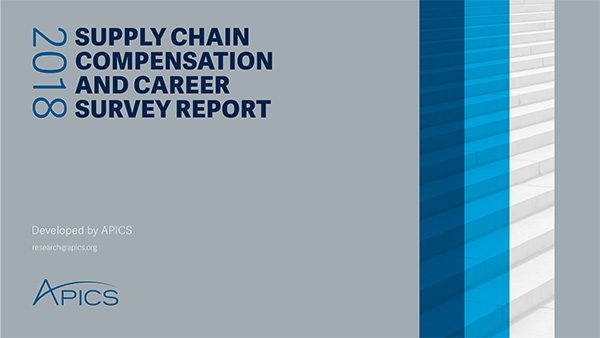Data from more than 2,600 U.S. supply chain professionals was gathered by APICS as it recently conducted the 2018 Supply Chain Compensation and Career Survey. The report was published, and contains many revealing details about the industry.
Indeed, the inaugural annual survey shows a healthy outlook for those employed in supply chain, with wage increases and high job satisfaction reported across the profession.
Key findings reveal the average salary for supply chain professionals in 2017 was $85,210. In addition, 90 percent of respondents received an average salary increase of at least 3 percent in 2017 and nearly all reported they are happy and likely to remain in the supply chain field.
Dean Martinez, executive vice president and chief operating officer at APICS, told SCMR in an interview that researchers were surprised that starting salaries for new hires were slightly higher than those of established managers.
“While the numbers were not that much more than the average salary, it indicates that younger people might be better at negotiating at the early stage of their careers. But it also speaks to the ‘war on talent' that is being waged in other industries.”
According to Martinez, the finance and marketing sectors are wooing the same pool of young graduates vying for supply chain management positions.
 “But the higher entry-level salaries are making our industry more competitive,” he says. “And that helps address some of the concerns young people might have with erasing student debt.”
“But the higher entry-level salaries are making our industry more competitive,” he says. “And that helps address some of the concerns young people might have with erasing student debt.”
APICS has a program in place to address the student debt issue, adds Martinez.
“And the intelligence we gathered on the advantages of APICS certification was also encouraging,” he says. “We were very excited by the number of members responding to our survey, and we plan to concentrate on compensation from now on.”
Martinez also notes that future surveys will be more international in scope.
“There's a blurring of lines between logistics managers and supply chain managers when you examine the global arena,” he says. “Here in the U.S., logistics is seen as more tactical, and SCM more strategic. But the distinction is not always recognized in other countries. We aim to gain a better understanding of that in our next survey.”
The survey shows that continued professional education has a large impact on the salaries of supply chain professionals. Survey respondents who indicated holding one certification reported a median salary that was 19 percent more than their peers without certifications.
Respondents who earned an APICS certification reported a median salary that is 27 percent more than those who indicated that they did not have any certification. Certifications were also found to have a continuing career impact.
Among workers with the same tenure in the field, those with an APICS certification reported higher salaries than those without one. The survey revealed that, despite growth in compensation and job satisfaction, there still is work to do when it comes to addressing the pay gap between men and women within the field.
SC
MR


Latest Supply Chain News
- AI, virtual reality is bringing experiential learning into the modern age
- Humanoid robots’ place in an intralogistics smart robot strategy
- Tips for CIOs to overcome technology talent acquisition troubles
- There is still work to do to achieve supply chain stability
- Blooming success: The vital role of S&OE in nurturing global supply chains
- More News
Latest Resources

 Explore
Explore
The Academy News
- AI, virtual reality is bringing experiential learning into the modern age
- Predicting stockouts: Enhancing FMCG resilience through data-driven insights
- Finding the Right Approach for Supply Chain Education
- The Supply Chain Triad
- Innovating Supply Chain Higher Education with Generative AI
- How Smart Supply Chain Management Boosts Brand Identity
- More The Academy
Latest Academy Resources

Subscribe

Supply Chain Management Review delivers the best industry content.

Editors’ Picks





